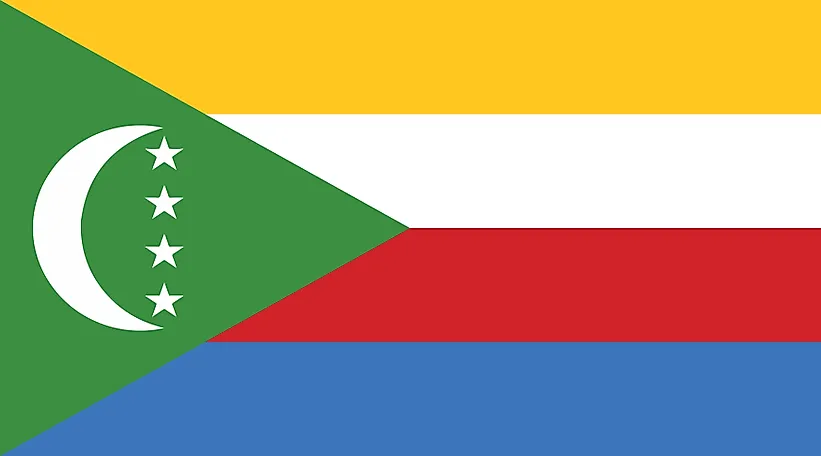
코모로
| 대륙 | 아프리카 |
| 자본 | Moroni |
| 인구 | 794,678 |
| GDP | $1.26억 |
| 1인당 GDP | $1,500 |
| 다이얼링 코드 | +269 |
| ISO 코드(2글자) | KM |
| ISO 코드(3글자) | COM |
About Comoros
Welcome to the Comoros, an archipelago nation nestled between Madagascar and the East African coast in the Indian Ocean. With approximately 850,000 people spread across three main islands – Grande Comore (Ngazidja), Mohéli (Mwali), and Anjouan (Nzwani) – occupying 1,862 square kilometers, the Comoros combines volcanic landscapes with rich cultural heritage. Known as the “Perfumed Islands” due to their fragrant ylang-ylang, vanilla, and clove plantations, these islands offer a unique blend of African, Arab, and French influences.
지리적 특징과 자연의 아름다움
The Comoros’ geography is characterized by volcanic islands featuring dramatic landscapes and diverse ecosystems. Mount Karthala on Grande Comore, one of the world’s largest active volcanoes, dominates the archipelago’s skyline, rising to 2,361 meters.
The islands feature pristine beaches with both black volcanic and white coral sand, surrounded by vibrant coral reefs teeming with marine life. The Mohéli Marine Park, the country’s first national park, protects significant populations of sea turtles and dugongs.
Each island has its distinct character: Grande Comore with its volcanic landscapes, Anjouan with its steep valleys and waterfalls, and Mohéli with its marine sanctuaries and rainforests. The country’s tropical climate supports lush vegetation and diverse wildlife, including the Livingstone’s fruit bat, one of the world’s largest bat species.
문화 유산과 전통
Comorian culture represents a fascinating blend of African, Arab, and French influences, shaped by centuries of maritime trade across the Indian Ocean. Islam plays a central role in daily life, with traditional Grand Marriages being particularly significant cultural events that showcase local customs and social structures.
Traditional arts include intricate woodcarving, particularly in the creation of doors and furniture, and the weaving of colorful textiles. Music and dance are integral to Comorian culture, with styles like the twarab combining Arab and African influences.
Comorian cuisine reflects the islands’ diverse cultural heritage and agricultural bounty, featuring fresh seafood, coconut, cassava, and various spices. The country is famous for its production of vanilla, ylang-ylang (used in perfumes), and cloves.
역사 여행
The Comoros’ history spans centuries of settlement by various peoples, including Bantu-speaking Africans, Arab traders, and Persian settlers. The islands were important stops along Indian Ocean trade routes, contributing to their diverse cultural heritage.
The archipelago became a French colony in the late 19th century and gained independence in 1975, though the island of Mayotte chose to remain under French administration. The post-independence period has seen various political challenges, though recent years have brought increased stability.
현대 경제 환경
Today’s Comoros has an economy based primarily on agriculture and fishing. The country is one of the world’s largest producers of ylang-ylang essential oil, used in perfumes and aromatherapy. Vanilla and cloves are also significant export crops.
Tourism, though still developing, holds significant potential due to the islands’ natural beauty and unique cultural heritage. The government has been working to improve infrastructure and attract investment in various sectors.
국제 관계 및 글로벌 포지셔닝
The Comoros maintains active participation in regional organizations including the African Union and the Arab League. The country works with various international partners on development projects and has been strengthening its diplomatic ties globally.
알고 계셨나요?
• The Comoros is the world’s largest producer of ylang-ylang essential oil?
• Mount Karthala has erupted more than 20 times since the 19th century?
• The islands are home to numerous endemic species, including the Livingstone’s fruit bat?
• Traditional Comorian doors are considered important works of art, featuring intricate carvings?
결론
The Comoros represents a unique blend of natural beauty and cultural diversity in the Indian Ocean. From its volcanic peaks to its coral reefs, from its traditional customs to its aromatic plantations, the Comoros offers visitors a distinctive island experience. As it faces challenges including climate change and economic development, the Comoros remains committed to preserving its natural environment and cultural heritage while working toward sustainable development.





